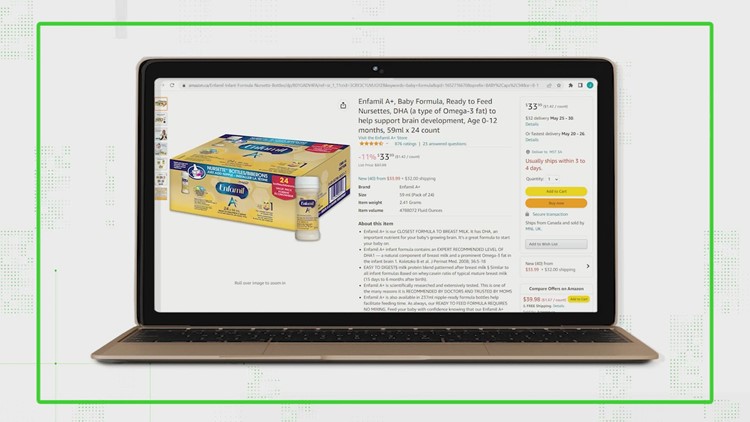HOUSTON, Texas — The formula shortage has parents going to all extremes to get their hands on food for their babies. So our VERIFY team looked into some of those efforts to see if they may do more harm than good.
Question 1: Is making your own baby formula safe?
Posts on social media have been giving parents different recipes for making their own formula, telling them it’s safe to do so.
Our source for this is Houston pediatrician Dr. Patti Savrick with Bootin and Savrick Pediatric Associates.
She said this information is false.
“It is not true that you can safely make infant formula at home. It’s a really kind of dangerous thing, and I've seen these recipes floating around on Facebook," Dr. Patti Savrick said.
She says making formula at home can be unsanitary, unsafe and will likely not support the baby’s nutrition or electrolyte balance.
“A baby’s only intake is the formula, so if we drink water and eat salty foods, our kidneys can handle putting that together in the right balance. A baby can not do that. Infant botulism and other forms of infant food poisoning are also a major problem," Dr. Savrick said.
She says diluting your baby’s formula is also dangerous.
Question 2: Can you ship baby formula from Canada?
A post has been floating around social media telling parents if they change their Amazon settings from the U.S. to Canada, "you can get all the formula you need."
We decided to verify this for ourselves, and while yes, it’s true that you can ship formula to the U.S. from Canada, it’s much more expensive and you probably won’t get all that you need.
But there's more you need to know.
This is from our National VERIFY team.
Third-party sellers can sell their items independently on Amazon. If their items aren’t fulfilled by Amazon, the seller will ship the order to you and handle customer service. VERIFY found some third-party sellers on Amazon who are selling baby formula products for high prices with quoted shipping prices to the U.S. of more than $30.
Though some third-party sellers on Amazon Canada may ship baby formula to the United States, medical experts like Jennifer Lightdale, M.D., a pediatric gastroenterologist at UMass Memorial Children’s Medical Center, warn against it.
“The formula that you’re buying from overseas is just not regulated the way we’re used to formula being regulated here in the United States. So even though things have clearly gone a little bit wrong right now, overall, we are used to high standards of quality and our government in general has done a great job of making formula very safe,” Lightdale said.
Lightdale also expressed concerns over “predatory activities” online as parents search for baby formula.
“You might think you're buying it [formula] from Canada, but somebody's giving flour in a can,” she said. “It would be very scary…if you don't really know who you're buying it from. So importing formula is just not advised.”
The American Academy of Pediatrics (AAP) advises against buying imported formulas online for a variety of reasons, including the lack of regulation by the U.S. Food and Drug Administration (FDA), concerns that imported formulas may not be shipped or stored correctly, and recall notice delays.
Infants have become sick or died from tainted formula products manufactured outside the U.S. The FDA was notified of six adverse events linked to imported European formulas in 2016 through 2017, according to a parenting website from the AAP. News of a recall in the country where a formula product is made might not reach the U.S. right away, either.
According to Children’s Hospital of Colorado, European baby formula products are illegal to sell in the U.S. because they aren’t regulated by the FDA.
Editor's note: This story has been edited to include information from our National VERIFY team that explains why it may be available to be shipped from Canada and why health experts warn against it.



